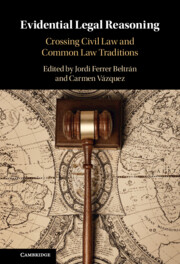Book contents
- Evidential Legal Reasoning
- Evidential Legal Reasoning
- Copyright page
- Contents
- Figures
- Tables
- Contributors
- Introduction
- Part I Evidence As an Area of Knowledge
- Part II Convergences between Systems
- Part III On Evidential Inferences
- Part IV Expert Evidence
- Part V Standards of Evidence As Decision-Making Rules
- 16 Burdens of Proof and Choice of Law
- 17 Is It Possible to Formulate a Precise and Objective Standard of Proof?
- 18 Prolegomena to a Theory of Standards of Proof
- Index
- References
16 - Burdens of Proof and Choice of Law
from Part V - Standards of Evidence As Decision-Making Rules
Published online by Cambridge University Press: 05 May 2022
- Evidential Legal Reasoning
- Evidential Legal Reasoning
- Copyright page
- Contents
- Figures
- Tables
- Contributors
- Introduction
- Part I Evidence As an Area of Knowledge
- Part II Convergences between Systems
- Part III On Evidential Inferences
- Part IV Expert Evidence
- Part V Standards of Evidence As Decision-Making Rules
- 16 Burdens of Proof and Choice of Law
- 17 Is It Possible to Formulate a Precise and Objective Standard of Proof?
- 18 Prolegomena to a Theory of Standards of Proof
- Index
- References
Summary
In private international law, the traditional view has been that all aspects of the burden of proof are procedural. It is typically inferred that a forum court properly uses the law of the forum on such matters even when comity dictates the recognition and application of the substantive law of another jurisdiction to the matter in dispute. However, this characterization has never been entirely accurate, at least in American law. Moreover, there has been discernible movement toward the opposite conclusion over the last century. In order to make sense of this, it is necessary to recognize that the two components of the burden of proof, the burden of persuasion and the burden of production, have quite different functions in an adversary system. Once these functions are identified, it becomes clear that only the burden of production, in both its allocation and the severity of the burden that it imposes, should be governed by forum law, while the burden of persuasion, in both its allocation and the severity of the burden that it imposes, should be treated as part of the substantive law that the forum court chooses to apply.
- Type
- Chapter
- Information
- Evidential Legal ReasoningCrossing Civil Law and Common Law Traditions, pp. 361 - 374Publisher: Cambridge University PressPrint publication year: 2022

